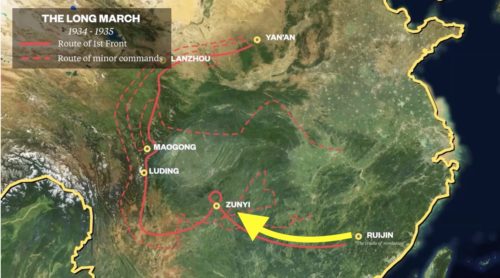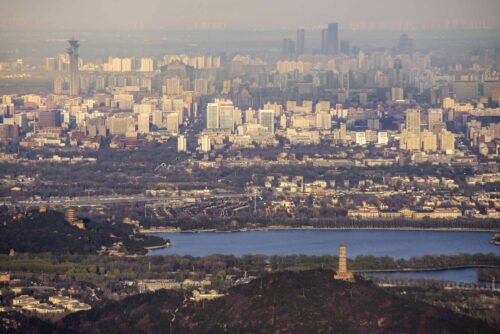Retracing the Long March: Middle-class dreams and mudslides
From 1934 to 1935, the Communist Party of China made a strategic retreat across the country, taking a circuitous 12,500-kilometer route that has been christened "The Long March." Last summer, Mads Vesterager Nielsen retraced this route on motorbike. This is Part 2 of his three-part dispatch.
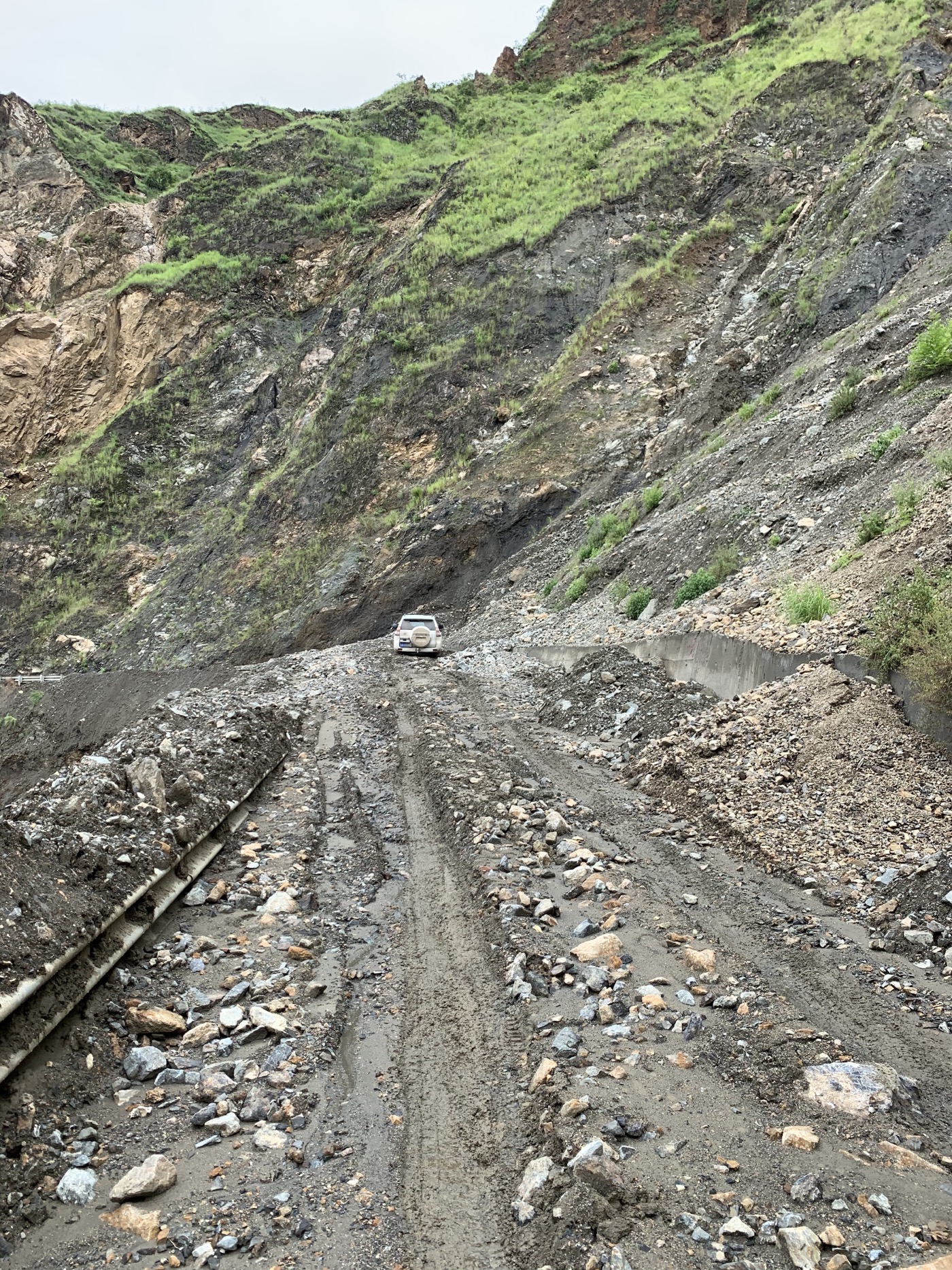

Cities and villages
Guizhou-Yunnan-Sichuan
I am on a motorbike journey tracing the Chinese Communist Party’s Long March route from Ruijin in Jiangxi province to Yan’an in Shaanxi. The days prior, I encountered a hermit in a “red cave” and policemen who were curious about my itinerary. I crossed the Xiang River, the site of an important battle where CCP forces were decimated. Now I am ready to move west.
The mountain roads zigzag past villages and peaks in the mountainous areas of central China’s Guizhou province. The people who live here — in remote and inaccessible countryside communities locked in difficult inland terrain — are among the poorest in the country, a target of many poverty alleviation campaigns. I feel utterly and completely shattered after a full day of motorbike driving through the sun and dust of the small Guizhou roads. The gas station attendants are shocked when they see my leathery face, which has by now withstood everything the Chinese roads can throw at it.
In Zunyi in northern Guizhou, Máo Zédōng 毛泽东 took the reins of the party, placing blame for the failure of previous campaigns on his opponents in the Party leadership, namely Bó Gǔ 博古 and the German Communist Otto Braun, a.k.a. Lǐ Dé 李德, who were both trained and controlled by Moscow.
I drive south. I get lost in the small roads in the dead of night. A group of boys lead me to their village to help me charge my phone. I have to meet a friend in Guiyang the next day, so I drive farther into the dark night. I pitch my tent on a road that is being rebuilt to get a few hours of sleep. I am occasionally awoken by beams of light from cars as they bounce over potholed roads.
In 2010, Guizhou was statistically China’s poorest province, but by 2019, the province’s per capita GDP had increased more than threefold. The fast growth that many other parts of China experienced more than a decade ago is now burning white hot in this area. The growth is fueled by rail and road infrastructure expansions, a provincial focus on the tech industry, central government-allocated subsidies related to the poverty alleviation campaign, and the tourism industry, which has branded Guizhou as an alternative to neighboring Yunnan, which is a well established tourist hotspot.
According to a study by Statista, Guizhou recently managed to climb from 31st place to 25th, above Hebei province and just behind Yunnan. My friend Zhang, whose house I arrive at around 8 a.m. the next day after only about three hours of sleep, is emblematic of this upswing in economic fortunes.
“Here is the kitchen! Here is the bathroom,” he greets me happily when I arrive. “We bought all our furniture at IKEA in Guiyang.”
My friend’s apartment is in the newest district in the provincial capital. The Future Arc, it is called — a new development area in Guiyang that occupies the valleys between at least three mountains. He bought the apartment in early 2016, before even a single piece of land had been turned there. Four years later, he has moved into the apartment with his wife and their two kids, having firmly secured his family a place in the Chinese middle class. The apartment is already worth a third more now than when it was built; there is both a Klippan sofa and a Knarrevik table, from IKEA, and a flat-screen television.
Zhang’s family development typifies the story of so many other Guizhou residents. He and his brother worked 10 years as migrant workers, saving up enough money, in order to secure an apartment in the city close to their ancestral home. He is banking on the development to continue, and hoping to sell the apartment with a considerable return in a decade or so. Economists often speculate about when the Chinese housing bubble may burst, but for now, it seems ordinary families in developing provinces are willing to bet that it won’t for the foreseeable future.
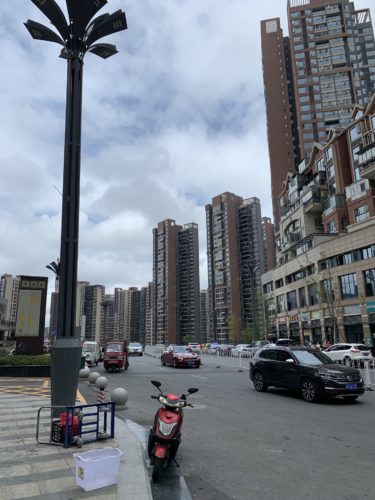
Together, we drive west. Deeper and farther into the mountains. “It makes no sense what Péngpèiào 蓬佩奥 says,” he shouts while sitting behind me on the motorbike, referring to the then-U.S. Secretary of State Mike Pompeo’s use of Donald Trump’s phrase “China Virus.” “China is the safest place,” Zhang adds.
We drive along hairpin bends. Up over mountain passes and down through valleys, past fields where crops sway in the wind. The trains are howling far away. Their tracks follow the top of the mountain ranges, in and out and through the rocky cliffs.
This is the deep Chinese countryside, where there is coal, ethnic minorities, and underdeveloped villages. Most people here will define accomplishment as being richer than their neighbor. When the children return home after years of work as migrant laborers, if they have accumulated enough wealth, the family’s status will be elevated, and a new home can be constructed on ancestral lands.
I follow the Long March route farther west into the difficult terrain of western Guizhou, with Zhang sitting behind me and helping me navigate. I have been invited to a wedding between Zhang’s cousin and another local family in a village close to the Yunnan province. When I get there, I see the host has cooked hundreds of dishes.
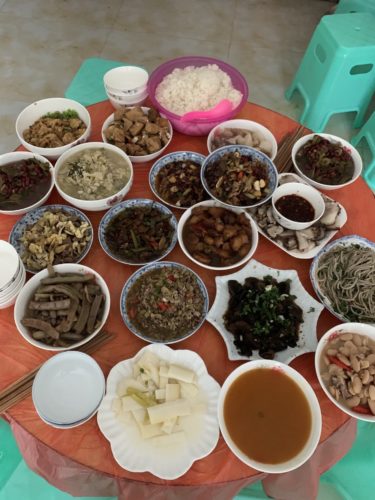
“China’s two best leaders are Mao Zedong and Xí Jìnpíng 习近平!” This declaration comes from the mouth of an 84-year-old Chinese farmer. He is puffing smoke from a silver pipe stuffed with a dried tobacco leaf. He hands the pipe to me, and after inhaling, I am immediately reduced to a minute-long coughing spree.
“Grandpa watches a lot more TV than I do,” my friend Zhang laughs.
The full extended families of the bride and groom have all gathered in this small village on the Guizhou mountainside. The men carry black jackets, a couple of Miao women are dressed in colored garments and head dresses, and six bridesmaids are clad in white dresses; they stick out in the crowd. The bride is wearing a red dress when the guests arrive; soon she will retire and put on a big Western-style white dress, for when the festivities pick up pace. This is intended to balance traditional and modern. In some parts of China, the red dress has become the preferred choice once again, but at this wedding, the white dress is still the one that will end up in the couple’s official wedding photo.
“She is so lucky,” says one of the bridesmaids. The bride is getting married to the heir of one of the local coal companies, so the family’s finances will be firmly secured. In dowry, the groom has presented a BMW GTE, worth a million RMB, plus an apartment in a nearby city.


The Long March road takes me through northern Yunnan and misty, terraced minority villages. It rains for days here. The mountainous regions of south and central China are infamous for dangerous floods and mudslides that cause havoc this time of year. The rain starts pouring down over the central and south Chinese highlands — specifically at the Jinsha River, where Communist forces crossed in 1935. The rainfall has caused heavy mudslides, and the river has swallowed up the road whole. I am forced to take a small detour, where I see a car sunk completely in the mud.
The route goes north, into Sichuan province. There are floods, roads are blocked, and trucks stop in kilometer-long queues. They are waiting for roads to be cleared of mud before they can continue toward the provincial capital of Chengdu. Drivers stand beside their mechanical beasts, smoking cigarettes or eating cup noodles.
It’s here that I reach a dead end, as the county road I was on has completely collapsed into a river, following a mudslide that started way up the mountain. The mudslides come in many variations; sometimes an entire mountainside will wash down to the valley below, destroying everything in its path. This mudslide is smaller, but I can see that it started hundreds of meters up the slope, catching everything in its way before ramming into — and through — the asphalt road I’m currently standing on.
I am in the center of Yi lands here. In Party annals, the Yi people are revered for granting the Red Army safe passage through these areas. I immediately draw attention to myself as one of the only outsiders in the area.
“You will never cross over to the other side without us,” a man comes up to me and says. “Think about it.” China’s minorities are often portrayed on state-owned TV channels in colorful folk costumes while singing and dancing, but the four Yi minority men standing in front of my motorcycle are clad in black t-shirts and chain-smoking. An opportunity has arisen for them to make some money in the middle of the flooded mountain landscape.
There is a young man next to me who is being offered the same deal. He is a 25-year-old with blue hair who has driven a Honda 450 out into the mountains while on vacation from studying to become an instructor at a Confucius Institute. The situation demands that we work together. Either the motorcycles have to be carried by hand over the damaged sections of the road, or they have to be loaded onto a truck so they can be transported on the Chinese highway, where motorcycles are banned in this part of China. Out here, far up in the Sichuan mountains, we are both on shaky ground. And the mood is tense.
“2,000 RMB,” one of the young Yi men says, which is about $300. I can sense that he is anxious to get the haggling started. “The four of us can carry your motorcycle over the hole.” It is definitely a risky endeavor. If they slip, they will fall into the river with the motorcycle. If successful, it will be good money for less than an hour of work. We are a low-hanging business opportunity ripe for picking.
I pull the young man aside. I cannot immediately determine how much money he is willing to throw at this unplanned inconvenience.
“400 RMB,” I give as a counteroffer. They all laugh. Except for one of the men.
“Then you must take the detour,” another of the Yi men says.
The man who has remained silent suddenly utters: “800 — then I’ll take you on my truck!”
The other three begin to vehemently oppose this, but they have been out-bid. We end up agreeing on 700 RMB, or just over $100.
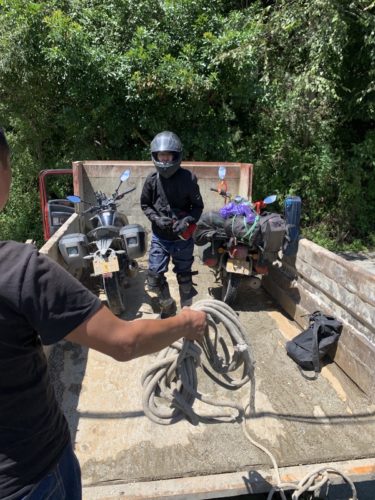
“I could not wait there all day,” the truck driver laughs while our motorcycles are strapped to the back.
We strike up a conversation in the front seat. “The Communist Party has done well,” he says. “Meigui criticize us for no reason.” Meigui is a portmanteau that means, literally, “American devil.” I am not American, but he takes my whiteness to signify something similar. “My wives will be happy with the extra money I get from you.”
“Wives?” the young Confucius instructor and I both exclaim.
“Don’t worry, they live in seperate villages,” he laughs. “The village officials don’t have to find out.”
The young Confucius Institute instructor turns to me. “Did you ever ask about Tibet or Taiwan when you took courses at the Confucius Institute?” he asks.
“No,” I answer. “I knew I could find that information elsewhere.”
He nods. “It may be that the teachers want to talk to you about it in person over a lunch, but never in class.”
“My dream is to become a writer,” he adds. “I write poems and short stories, but I lack experience, so I like to go on motorcycle trips to get inspiration. That is why I also want to go out into the world, and I can do that with the Institute. One of my dreams is to travel the world — but that has been indefinitely postponed!” We share a knowing laugh.
The Yi minority driver unloads our motorbikes after an hour of driving on the highway, still deep in the heart of the Sichuan mountains. I bid farewell.
“Let me know when you are in Chengdu!” the Confucius instructor says before speeding away.
This is Part 2 of 3 of Mads Vesterager Nielsen’s motorbike trip along the Long March route. Read: Part 1, Part 3.
